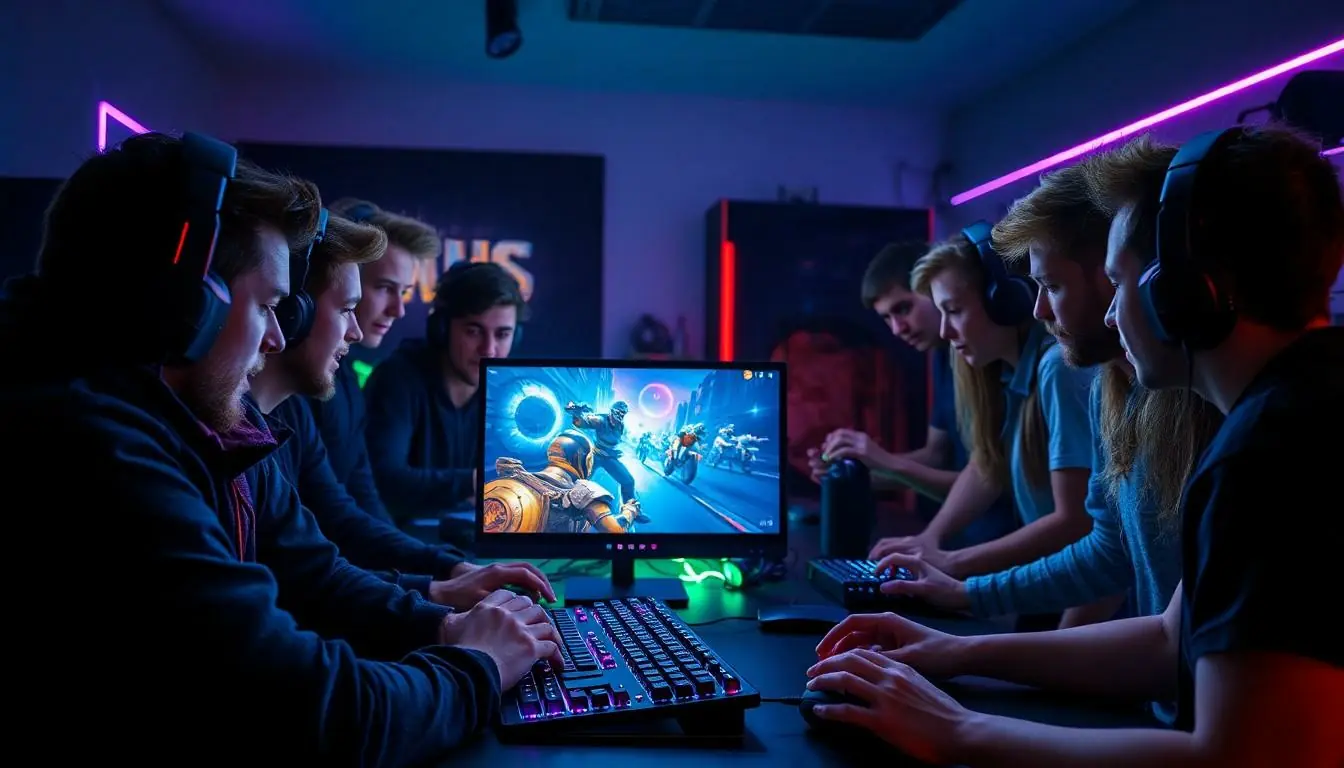Table of Contents
ToggleChoosing the right operating system for a gaming PC is like picking the perfect sidekick for an epic adventure. It can make or break the experience, and let’s be honest, no one wants to face the final boss with a laggy OS. Whether you’re slaying dragons or racing cars, the right software can elevate your gaming to legendary status.
Overview Of Operating Systems
Operating systems play a crucial role in the functionality of gaming PCs. They manage hardware resources, provide user interfaces, and facilitate software applications. Several operating systems are popular among gamers, each offering unique advantages.
Windows leads the market share among gaming operating systems. Its software compatibility and extensive game library make it a top choice for many gamers. Gamers can find numerous titles optimized for Windows, offering high performance and ease of access.
Linux serves as an alternative for those who prefer open-source platforms. While not as widely adopted for gaming, it provides excellent performance with the right configurations. Gamers often appreciate its customization options and the potential for a lightweight system.
macOS caters to a niche market in gaming. Although certain exclusive titles are available, macOS lacks the extensive library present in Windows. Users interested in gaming on a Mac generally find limitations in software compatibility, impacting the overall experience.
Choosing the right operating system involves considering specific needs. Analyzing priorities, such as game library preferences, performance requirements, and hardware compatibility, leads to better decision-making. High-performance gamers typically favor Windows for its robust support and frequent updates.
Performance impact varies across operating systems. Gamers using Windows often experience optimized performance with graphics cards and peripherals. In contrast, users with Linux may need to adjust settings for optimal graphics performance, while macOS users may face performance limitations with certain games.
Selecting an operating system sets the stage for an enjoyable gaming experience. Understanding the strengths and weaknesses of each platform helps gamers choose one that complements their gaming style and hardware setup.
Key Features To Consider
Selecting the right operating system for a gaming PC involves examining key features that enhance overall performance and user experience. Choosing an OS with strong capabilities impacts gameplay significantly.
Performance Optimization
Performance optimization plays a crucial role in ensuring smooth gaming experiences. Windows offers DirectX compatibility, which boosts graphical performance for most games. Frequent updates address bugs and improve stability, making it the preferred choice for high-performance gamers. Linux users can achieve optimized performance through customization, though it requires more technical knowledge. macOS limits performance options due to its specific hardware configurations, often affecting frame rates. Gamers must consider the impact of their chosen OS on frame rates and loading speeds, prioritizing systems that support their preferred titles.
Resource Management
Effective resource management is essential for a seamless gaming experience. Windows excels at managing hardware resources, delegating memory and CPU efficiently across applications. Game developers frequently optimize their titles for Windows, leading to better resource utilization. On the other hand, Linux provides advanced users with the ability to customize resource allocation, potentially creating a lightweight gaming environment. In contrast, macOS struggles with resource management in gaming, limiting hardware upgrades and compatibility with many popular titles. Understanding how each operating system manages resources can guide gamers in making informed decisions that align with their gaming habits.
Popular Operating Systems For Gaming PCs
Several operating systems cater to gaming needs, each with unique strengths and limitations. Here’s an overview of the most popular options.
Windows 10
Windows 10 stands out as the top choice for gamers due to its extensive game library and software compatibility. A majority of AAA games support this platform, ensuring players can enjoy a variety of titles without issues. DirectX enhances graphical performance, making gameplay smoother and more immersive. Frequent updates improve stability and security, which benefits gamers. Many peripherals and hardware components also have driver support tailored for Windows 10, maximizing performance. Gamers often experience seamless integration with other software, further solidifying its reputation as the go-to gaming OS.
Linux Distros
Linux distros provide a viable alternative for gamers seeking open-source options. Known for customization, they let users tailor the operating system to optimize performance. However, compatibility with major titles is limited, with many games requiring additional tools like Proton or Wine to run. Users often enjoy a lightweight system, which can enhance gameplay experience. Advanced users benefit from the ability to configure resource allocation based on their gaming needs. Some popular gaming-focused Linux distros include Pop!_OS and SteamOS, which aim to offer enhanced functionality for gamers.
macOS
macOS caters to a niche market, attracting users who prefer Apple’s ecosystem. While it provides a sleek and user-friendly interface, the limited game library remains a significant drawback. Many games lack native support, forcing players to explore alternatives like Boot Camp or virtualization software. This situation can lead to performance issues with demanding titles. Moreover, macOS hardware configurations often limit options for upgrades, impacting overall gaming experience. Its emphasis on creativity and productivity may not align with hardcore gaming needs, making it less appealing for serious gamers.
Comparisons Of Gaming Performance
Assessing gaming performance among different operating systems reveals significant differences in user experience and technical benchmarks. Understanding these nuances aids in making informed decisions.
Benchmarks And Tests
Benchmarking provides critical insights into how each operating system performs during gaming. Numerous tests illustrate Windows consistently outperforms Linux and macOS in frame rates and loading times. For instance, in a standard 1080p gaming test, Windows 10 delivers around 70 FPS on demanding titles, while Linux manages about 50 FPS under optimal conditions. MacOS typically lags behind with some games running at only 40 FPS due to compatibility issues. Open-source tools like Proton and Wine can enhance Linux performance, but they often require extensive configuration. Collectively, these benchmarks highlight Windows as the superior choice for performance-focused gamers.
User Experience
User experience varies widely among operating systems, influencing gamers’ preferences. Windows offers a familiar interface and robust support for a vast majority of games. Regular updates maintain system stability, ensuring a smooth gaming experience. Players using Linux often encounter installation challenges and game compatibility concerns, although dedicated users appreciate the customization options available. On the other hand, macOS presents a sleek interface but suffers from limited game selection and performance issues. Overall, Windows stands out for delivering a seamless gaming experience, while Linux appeals to those willing to trade convenience for control and macOS caters to a niche market with specific software demands.
Conclusion
Choosing the right operating system for a gaming PC is crucial for maximizing performance and enhancing the overall experience. Windows remains the top choice for gamers due to its extensive library and robust support for hardware and software. It consistently delivers high frame rates and smooth gameplay, making it ideal for serious gaming.
While Linux offers customization and lightweight options for those willing to invest time in setup, its compatibility with major titles can be limiting. macOS, despite its sleek design, falls short in game availability and performance. Ultimately, understanding the unique strengths and weaknesses of each operating system allows gamers to make informed decisions that align with their specific needs and preferences.







